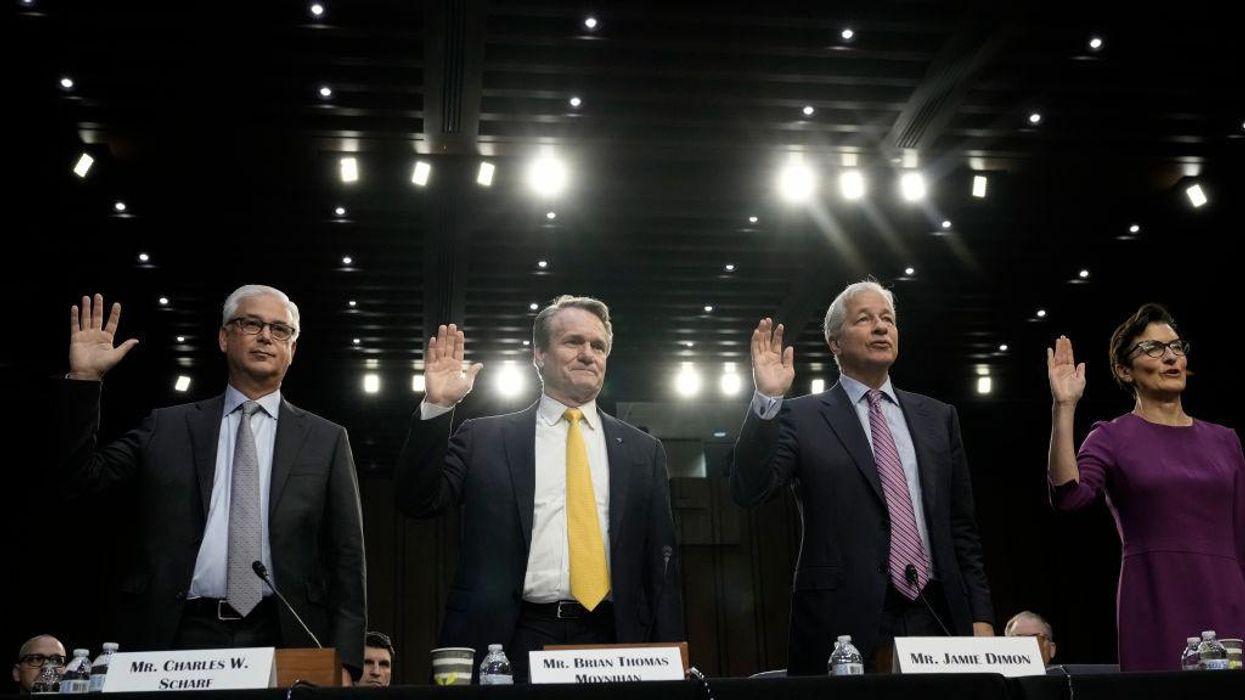
Photo by Drew Angerer/Getty Images

The midterm elections, wherein the Republicans reportedly have a 70% chance of winning the House, are less than a month away. While still exerting a significant amount of monetary influence over the races, American commercial banks have reportedly adjusted their political giving strategies.
In this election cycle, the banks' political action committees (PACs) are simultaneously giving less to federal candidates while giving a greater share to Democrat candidates than they have in over a decade.
Reuters conducted an analysis of data compiled by the Center for Responsive Politics, the nonprofit organization behind OpenSecrets, which documents financial influences on members of Congress. Commercial banks' PACs have reportedly given an estimated $7.4 million to federal candidates in this cycle. This represents a 43% decrease in political giving over the previous election cycle.
Notwithstanding the overall drop in giving, Democrat candidates are now receiving a 40% share or $2,975,965 of the $7.4 million total — the party's largest proportion of banker support since 2010. Republicans received $4,447,321.
Reuters reported that "of the top-20 congressional recipients of bank PAC donations this cycle, 10 are Democrats compared with six in 2020, three in 2018, and one ahead of the 2016 election."
Among those commercial bank PACs in the top 20 for donations to federal candidates in the 2021-2022 cycle are:
This rearrangement may be politically expedient for banks, which have in recent years received a great deal of criticism from Republicans and applause from Democrats for taking liberal stances on social and cultural issues.
Brian Gardner, chief Washington policy strategist at Stifel Financial Corp., told Reuters: "The days when the largest banks could rely on Republicans for some level of defense, I think those days are over."
For instance, last month at a congressional oversight hearing, Sen. Pat Toomey (R-Pa.) urged bank executives to stop "embracing a liberal ESG agenda that harms America ... I can't help but observe that when banks do weigh-in on highly charged social and political issues, they seem to always come down on the liberal side."
In "The Dictatorship of Woke Capital," Stephen Soukup suggested that 2019 was "a year of awakening."
For years, Soukup argued, the financial and corporate worlds were slowly taken over by woke thinking and its corresponding ESG/DEI policies.
In 2019, however, "after years of flying under the radar and, as a result, having a free hand to change American business to suit their own needs, the activists of woke capital pushed too far and alerted too many Americans, previously blissfully unaware, that a concerted effort was being made to undermine the last of the great institutions of the West."
In response to the pressure campaign executed by big corporations after Georgia Gov. Brian Kemp (R) signed a pro-life "heartbeat bill" into law, Sen. Tom Cotton (R-Ark.) stated on June 19, 2019, that "We resolve our differences and reach compromises through democratic debate. What should never happen is billion-dollar corporations trying to dictate these moral questions to us."
Cotton suggested that "as liberal activists have lost control of the judiciary, they have turned to a different hub of power to impose their views on the rest of the country."
According to Soukup, Cotton had "stumbled upon the effort of the political Left to harness the power of business, and especially capital markets to advance overtly and exclusively political ends." His opposition and others' were signals that, in light of Wall Street's embrace of and service to leftist thinking, there would soon be significant tension between conservatives and big money.
Soukup named JPMorgan, Fidelity, Bank of New York, Goldman Sachs, and a host of other banks that have in recent years formally adopted policies, rhetoric and stances at odds with conservatives and the Republican Party.
Last year, the Pew Research Center observed the impact the what Soukup referred to as an "awakening."
Pew found that, since 2019, the share of Republicans who claimed that large corporations had a positive impact on the way things are going in the U.S. declined from 54% to 30%, a decrease of 24 points.
At the same time, Democrats warmed up to big corporations, with their expression of positive views increasing from 23% to 28%.
The tensions between the GOP and Wall Street are not merely rhetorical.
Last year, 15 Republican states threatened to pull $600 billion from banks whose woke policies threatened critical American industries. West Virginia Republican Treasurer Riley Moore told the Federalist that the objective was to "protect our states' economies, jobs, and energy independence from these unwarranted attacks on our critical industries," advanced by "woke capitalists."
Reuters reported that just as growing tensions between Republican and woke elements of the commercial banks may be to blame for a shift in the latter's election spending, the banks' priorities are also being shifted as the result of internal and shareholder pressure campaigns.
Rep. Joyce Beatty (D-Ohio), who chairs the House Financial Services panel's subcommittee for diversity and inclusion, is the top Democrat congressional recipient of bank PAC money. Reuters indicated that there is a trend of bank money flowing to others like Beatty who champion ESG and DEI policies, which are similarly touted on Wall Street.
As much as the shift signals a growing ideological preference and reorientation, the banks are also engaged in shrewd realpolitik.
Camden Fine, the former president and CEO of the Independent Community Bankers of America, stated, "Banks that are active givers to political campaigns are hedging their bets."